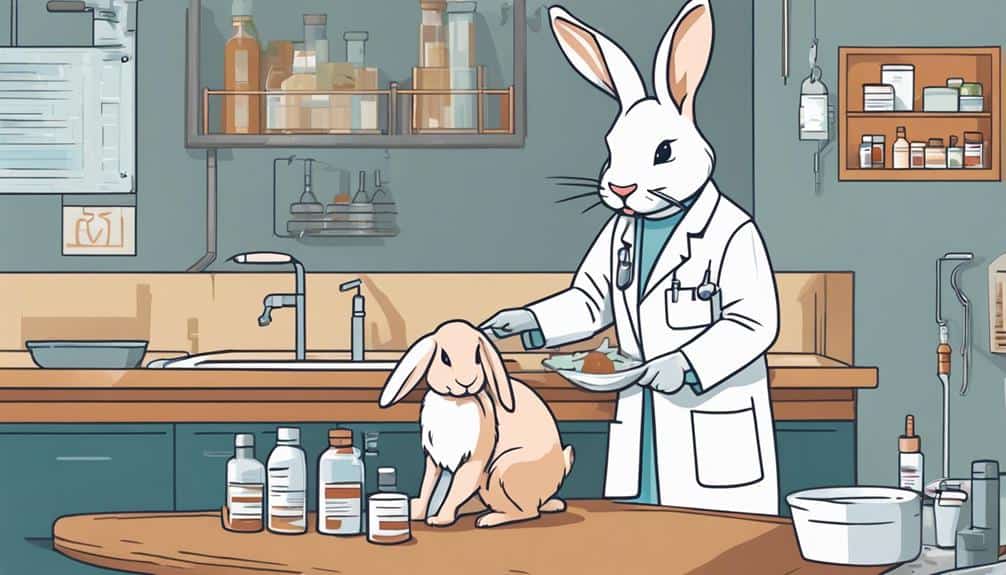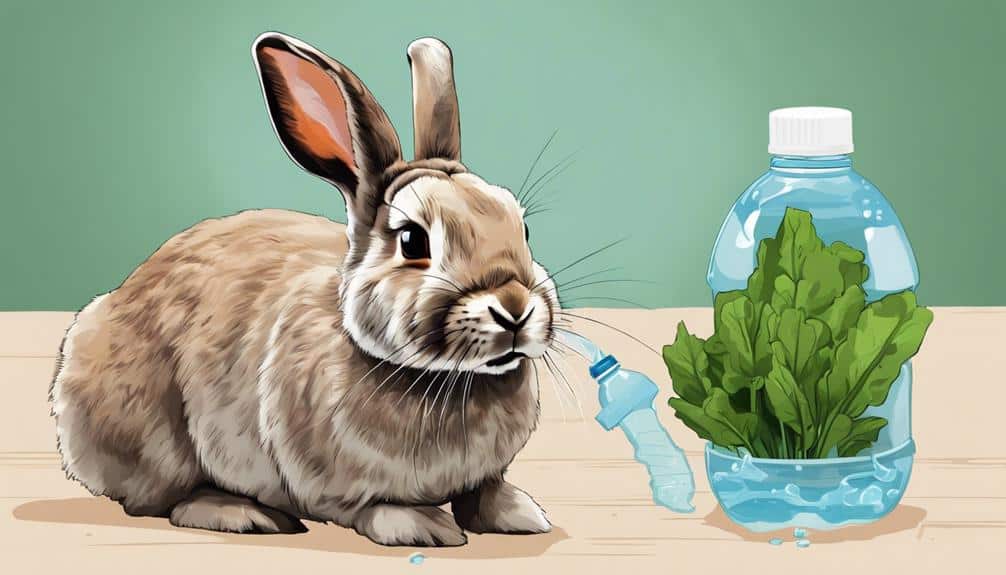Imagine a serene garden where fluffy bunnies hop around without a care in the world, their soft fur glistening in the sunlight. But amidst this idyllic scene, a silent threat lurks.
Did you know that these adorable creatures can fall prey to urinary tract infections? Surprising, isn't it?
Let's explore the hidden dangers that can affect your furry friends and how to safeguard their health effectively.
Contents
- 1 Key Takeaways
- 2 Understanding Rabbit UTIs
- 3 Symptoms to Watch for
- 4 Common Causes of UTIs
- 5 Diagnosis and Veterinary Care
- 6 Treatment Options for Bunnies
- 7 Recovery and Prevention Strategies
- 8 Rabbit UTI Management Guide
- 9 Can Bathing a Bunny Rabbit Cause Urinary Tract Infections?
- 10 Frequently Asked Questions
- 11 Conclusion
Key Takeaways
- Rabbit UTIs are serious bacterial infections that require prompt veterinary care.
- Symptoms like inappetence, urinary incontinence, and excessive genital licking indicate UTIs.
- Excessive dietary calcium, chronic dehydration, obesity, and soiled bedding can cause UTIs in rabbits.
- Proper diagnosis, treatment, and prevention strategies are crucial for managing and preventing UTIs in bunnies.
Understanding Rabbit UTIs
When considering the health of your bunny, it's essential to understand the implications and characteristics of urinary tract infections (UTIs) in rabbits. Rabbit UTIs are bacterial infections that can lead to pain, discomfort, and potentially serious consequences if left untreated.
High levels of calcium in rabbit urine can contribute to the development of UTIs, emphasizing the importance of a well-balanced diet for your furry friend. Timely treatment is vital to prevent long-term bladder damage, as untreated UTIs can result in urinary incontinence and chronic dehydration in rabbits.
Causes of UTIs in rabbits vary and can include factors such as excessive dietary calcium, chronic dehydration, obesity, back injuries, and exposure to soiled bedding. Being aware of these causes can help you take preventive measures to safeguard your bunny's health.
Recognizing symptoms like urinary incontinence, inappetence, and excessive genital licking can prompt you to seek veterinary care promptly, ensuring your bunny receives the necessary treatment to recover from UTIs effectively.
Symptoms to Watch for
To identify potential urinary tract infections in your bunny, it's essential to watch for specific symptoms that may indicate a health issue. Here are three key symptoms to observe:
- Changes in Urine Color: Keep an eye out for thick, beige, or brown-colored urine in your rabbit. Any deviation from the normal pale yellow color may signal a problem with their urinary tract.
- Signs of Discomfort: Watch for signs like frequent urination, painful urination, or a hunched-over posture while urinating. These behaviors could indicate that your bunny is experiencing discomfort or pain related to a urinary issue.
- Abnormal Urine Characteristics: Be alert to cloudy-looking urine, blood in the urine, straining to urinate, lethargy, or unusual changes in urine odor. Any of these abnormalities in your bunny's urine could be indicative of a urinary tract infection.
If you notice any of these symptoms in your rabbit, it's important to seek prompt veterinary consultation to guarantee a timely diagnosis and appropriate treatment for their urinary health.
Common Causes of UTIs

Excessive dietary calcium, chronic dehydration, obesity, back injuries, and soiled bedding are commonly identified as the key causes of urinary tract infections (UTIs) in rabbits. High levels of calcium in the urine can contribute to the development of UTIs, leading to symptoms like pain, urinary incontinence, inappetence, and excessive licking of the genital region. Proper management of alfalfa intake and adjusting the diet based on the rabbit's history can help prevent UTIs. Timely treatment with antibiotics and addressing excess calcium in the diet are essential for managing and preventing UTIs in rabbits.
| Common Causes of UTIs in Rabbits | |
|---|---|
| Excessive dietary calcium | Chronic dehydration |
| Obesity | Back injuries |
| Soiled bedding |
Diagnosis and Veterinary Care
Diagnosing and providing veterinary care for urinary tract infections in rabbits involves a thorough approach that includes physical examination, urinalysis, and imaging tests. Here's what you need to know:
- Thorough Evaluation: Veterinary professionals will conduct a physical examination to assess your rabbit's overall health, focusing on symptoms related to the urinary tract. Urinalysis helps detect the presence of bacteria, blood, or crystals in the urine. Imaging tests such as X-rays or ultrasounds may be necessary to visualize the bladder and urinary tract for any abnormalities.
- Antibiotic Treatment: Prompt treatment with antibiotics prescribed by a veterinarian is essential for combating rabbit UTIs. These medications are tailored to address the specific bacteria causing the infection. Follow your vet's instructions carefully to ensure the full course of antibiotics is completed for effective treatment.
- Monitoring and Check-ups: Monitoring your rabbit for symptoms like inappetence, urinary incontinence, and excessive licking of the genital region is important. Regular veterinary check-ups play a crucial role in managing and preventing urinary tract infections in bunnies, allowing for early detection and intervention to maintain your rabbit's bladder health.
Treatment Options for Bunnies

When treating urinary tract infections in bunnies, it's essential to follow a thorough approach that includes antibiotic therapy prescribed by a veterinarian. Antibiotics play an important role in combating bacterial infections that cause urinary tract issues in rabbits. Additionally, providing proper pain management and ensuring adequate hydration are key aspects of supportive care during treatment. In severe cases where complications or blockages arise, surgical intervention may be necessary to address these issues effectively.
Dietary changes are also key in managing and preventing urinary tract infections in bunnies. Avoiding high-calcium foods, such as alfalfa pellets, can help reduce the risk of recurrence. Regular monitoring of your bunny's condition and diligent follow-up care with the veterinarian are important to track progress, adjust treatment plans as needed, and prevent future infections. By following these treatment options diligently and incorporating all the necessary elements, you can help your bunny recover effectively from a urinary tract infection and minimize the chances of it happening again.
Recovery and Prevention Strategies
To facilitate your bunny's recovery and prevent future urinary tract infections, implementing proper hydration and a balanced diet is essential. Here are some strategies to aid in the recovery and prevention of urinary tract infections in bunnies:
- Antibiotic Treatment: Follow your veterinarian's prescribed antibiotic treatment regimen diligently to confirm complete recovery from the urinary tract infection.
- Hydration and Balanced Diet: Offer fresh water daily and provide a diet rich in fiber to promote urinary tract health and prevent future infections.
- Monitoring and Clean Environment: Regularly monitor your bunny's urine output and behavior for any signs of recurrence. Maintain a clean living environment to reduce the risk of bacterial contamination.
Remember to minimize stressors in your bunny's life and consult with your veterinarian for tailored care plans and follow-up appointments to prevent the recurrence of urinary tract infections. By incorporating these strategies into your bunny's routine, you can help them recover effectively and reduce the likelihood of future UTIs.
Rabbit UTI Management Guide

To effectively manage urinary tract infections in rabbits, it's important to be vigilant for symptoms such as urinary incontinence, inappetence, and excessive grooming of the genital area. Treatment options typically include timely diagnosis, antibiotic therapy, and addressing any underlying causes contributing to the UTI, like excess dietary calcium.
Symptoms of Rabbit UTI
If you notice your rabbit displaying symptoms such as frequent urination, changes in urine color, or difficulty while urinating, it may be indicative of a urinary tract infection. Here are some common signs of a rabbit UTI to watch out for:
- Hunched-over Posture: Rabbits with UTIs may adopt a hunched-over posture while urinating.
- Blood in Urine: Blood in the urine, along with straining to urinate, can signal a urinary tract infection.
- Lethargy: If your rabbit appears lethargic, excessively licks the genital region, or has cloudy-looking urine, it could be due to a UTI.
Treatment Options for Rabbits
Addressing the symptoms of a rabbit UTI promptly is important in implementing effective treatment options for your furry companion. Rabbit UTI treatment often involves the use of antibiotics such as Trimethoprim sulfa or Enrofloxacin to combat the infection.
In severe cases, surgical intervention may be necessary to address the urinary tract issue. Additionally, managing excess dietary calcium is essential in preventing recurrent UTIs in rabbits. Proper monitoring and follow-up care are essential throughout the treatment process to guarantee your rabbit's recovery.
Consulting a veterinarian for tailored treatment recommendations is key in managing rabbit UTI effectively. By following these treatment options and guidance, you can help your bunny overcome UTIs and maintain their overall health and well-being.
Can Bathing a Bunny Rabbit Cause Urinary Tract Infections?
If you’re considering bathing a bunny rabbit, it’s important to be aware of potential risks. According to a bathing a bunny rabbit article, excessive bathing can disrupt the natural balance of bacteria in a rabbit’s urinary tract, increasing the risk of urinary tract infections. It’s best to consult a veterinarian before attempting to bathe a bunny rabbit.
Frequently Asked Questions
How Do You Tell if a Rabbit Has a Uti?
To tell if a rabbit has a UTI, observe for symptoms like urinary incontinence, excessive licking, and changes in urine color or frequency. Seek vet care for diagnosis through tests. Treat with antibiotics, manage diet, and make sure proper hydration to prevent UTIs.
Why Is My Rabbit Peeing Uncontrollably?
If your rabbit is peeing uncontrollably, several factors may contribute. Behavior, diet, stress, environment, medical conditions, hormonal imbalances, genetic predisposition, and urinary tract health play roles. Identifying triggers is important for appropriate treatment.
What Causes Cystitis in Rabbits?
Wondering what causes cystitis in rabbits? Bacterial infections, dietary issues, dehydration, obesity, and stress are common culprits. Prompt veterinary care, proper diet, stress management, and clean environments help prevent and treat cystitis in rabbits effectively.
What Is the Disease in Rabbits Urine?
Urinary problems in rabbits can lead to discomfort and health issues. Treatment options include medication and diet changes. Preventing UTIs involves proper hydration and a clean environment. Common symptoms like incontinence signal the need for veterinary care.
Conclusion
Congratulations! You're now a UTI expert for bunnies. Keep an eye out for those sneaky symptoms and act fast to guarantee your furry friend stays happy and healthy.
Remember, preventing UTIs is key, so stay vigilant and follow the guidelines provided. Your bunny will thank you for it!






